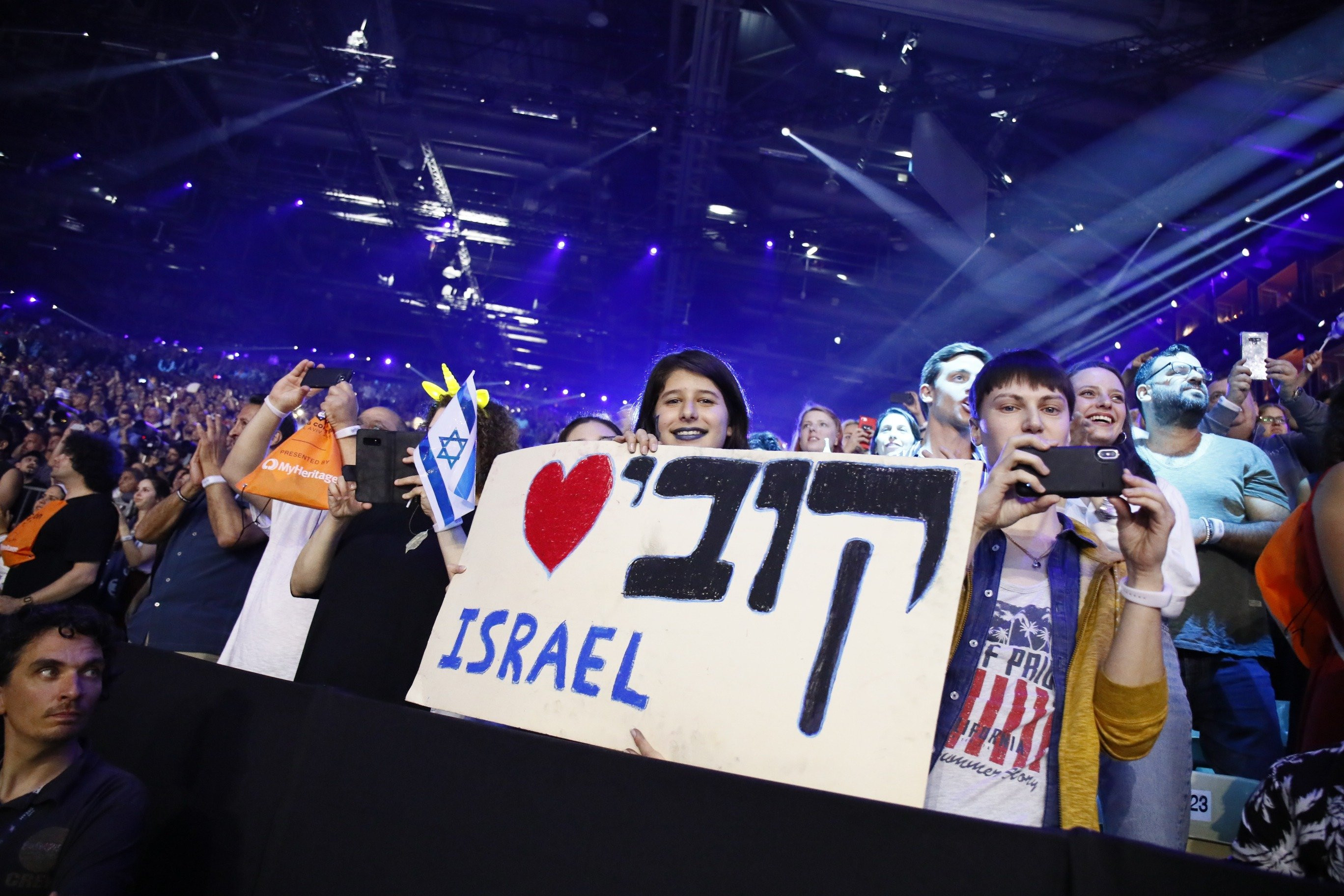
The View from San Francisco: Rotterdam, or Anywhere

The View from San Francisco: Rotterdam, or Anywhere
Time is a funny thing. The seven weeks before I left for Tel Aviv? Time didn’t move. Not even a little tiny bit. It felt like a year. The seven weeks since the last night in Expo? They’ve flown by. Because, seriously, how is it July already? And how is it that, after spending a year feeling so involved and invested in every detail of the upcoming ESC production, next year’s one feels like it’s taking place in a parallel universe? The non-stop stream of news coverage, even when there was nothing new (or verified or, you know, remotely accurate) to report, was exhausting. I have no idea what the situation is like with the Dutch media, but I’m enjoying not feeling like I need to find out. Israel obviously had its fair share of problems that were unique to this particular edition of the contest, but no production is free of dramas, so what can I say, Dutch friends? Good luck with that. I’m just going to sit here in my sunny California corner and enjoy some peace and quiet. Call me when your stage is ready.
Visionary Dream
One of the many odd things that comes with the territory of being the host country is a slightly misplaced sense of ownership. For example, I really love this year’s stage and therefore I’m somehow also proud of it, even though I obviously had no part in creating it.
One of the biggest challenges Israel faced as a host country this year – and also one of the topics which was discussed the most often – was the lack of a proper hall, or rather, the lack of a proper hall in a city that was really a much more suitable choice for the event Eurovision has become. For better or for worse, the Eurovision in Tel Aviv will be a case study for years to come. One very obvious negative point that will need to be addressed in future is the financial implications. Being a new public broadcaster, having no financial contribution from the government and a very small hall in a very expensive country left Kan with very few funding possibilities, which in turn led to the high ticket prices. It’s easy to get angry and shout words like “greed”, but the truth – as always – is more complicated. Still, this should be a red flag for the EBU, whose investment in the desire of making Eurovision a bigger-and-better sort of event is driving many potential hosts to being weary of participating or actually trying to win.
That aside, Kan showed it is possible to hold Eurovision in a smaller hall, something that has become a make-or-break thing over the last decade or so. It is, as they continuously tried to remind us, a television show, and the main objective is that it should look good on TV.
Last year, I had a very long rant about Sweden’s staging and how they essentially dismissed the local effort completely by never showing anything they didn’t bring with them from home. Truth be told, though, I wasn’t a big fan of the stage last year anyway, and I can understand the reluctance of delegations to show off the local stage when that makes it very hard to set yourself apart from the opposition, short of surrounding yourself with props.
What I liked about the 2019 stage was that it offered so many options – it wasn’t just about the backdrop or floor art, but the positioning and flexibility of elements, all of which allowed delegations to create a unique visual identity for themselves (as long as they put some effort into it). And it was actually possible to achieve quite a lot with the stage even if you had no props.
More than that, I enjoyed seeing delegations actually using the various tricks it had to offer – there are editions of ESC where all kind of cool features are added but barely anyone uses them, but it felt like delegations were both more aware of the possibilities this year and also more willing to use them. I hope that going forward, host countries will take a leaf out of this particular book and focus on building stages that allow delegations to focus less on the gimmicks and props, and more on how to just make their song come across the best they can in the unique setting of that particular year.
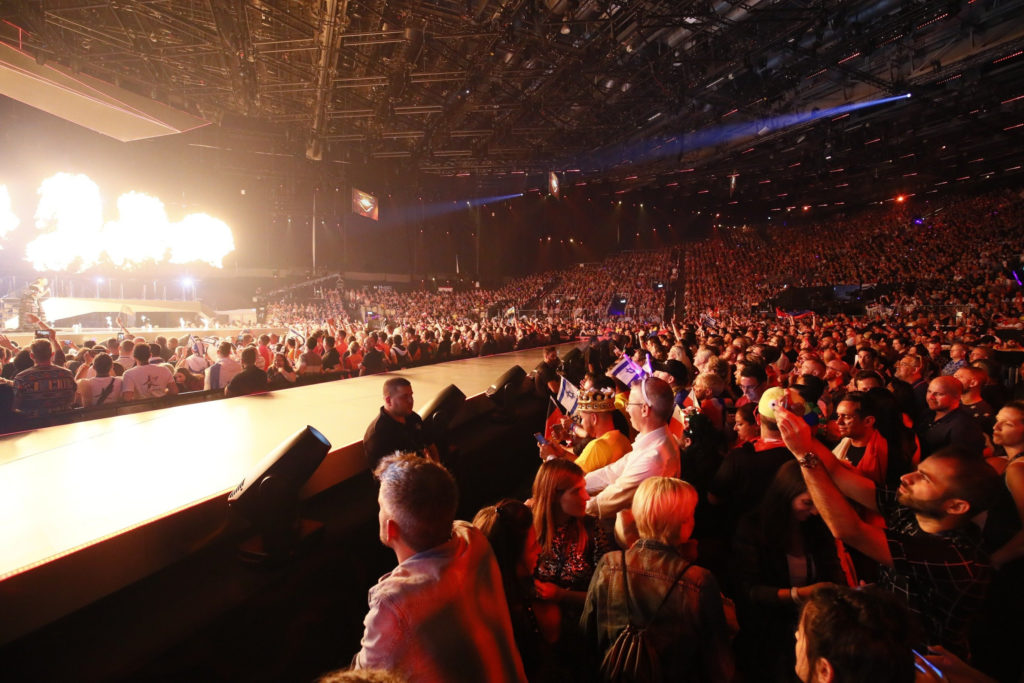
Size isn’t everything
Be My Guest
Another thing I never realized until sitting through this year’s dress rehearsals was how much local culture finds its way in, and not just when it comes to interval acts.
The area where it jumped at me the most, way more than any other year, was watching the hosts. Each of them had a different temperament, and yet they all shared something very Israeli in the way they presented and communicated – a form of unapologetic directness in which we flat-out refuse to engage in any forms of socially acceptable politeness unless we actually mean it.
Erez, by his own admission, was the responsible adult, and as the most experienced figure in the quartet he was actually very dominant throughout rehearsals, helping the other three to find their feet and figure things out. But as a person who thrives on high-pressure situations, he had a harder time on the actual nights where he actually had to stick to the script and not step in to guide the others through difficult situations. If any live crisis had happened during the show, he would have been the one to take control of the situation – he’s the person who can keep presenting like absolutely nothing is wrong even while an alien invasion takes place right behind him. But since the event was generally crisis-free, bar Madonna’s performance, the better part of his contribution was the tidbits he provided off-stage – I’ll probably always laugh when I remember his story about the show’s director singing “Say Na Na Na” into his earpiece during one of the live broadcasts – and it’s hard to not be sympathetic to a host who says he started his Eurovision journey knowing little about the contest but that he now suffers from PED (yes, he actually used that term).
The cringe-worthy dialogue was there as it is every year – but like I said above, considering that we Israelis tend to be both very cynical and very much devoid of communication habits that can be perceived as polite, the delivery was self-aware enough to be surprisingly bearable. Also, like the good Mediterraneans we are, there was a good measure of jumping into each other’s sentences and sometimes winging it and having no idea who is supposed to speak next. But towards the end of the show, the combination of that mayhem, the general absence of decorum and our touchy-feely ways with a pinch of being oblivious to the idea of personal space, helped by how endearing Duncan was when he made it on stage, made the often stiff and uncomfortable final interaction between the hosts and the winner into something that felt more sincere and very human.
Shortly before that, there was another little lovely moment that I almost didn’t catch until re-watching the end of the vote several more times, in which the Netherlands wins and behind them, to the far end of the green room, the entire Israeli delegation – including performers and crew who were part of last year’s winning delegation – stand huddled in a half circle and cheer the winner on: a figurative tip of the hat from the last winner to the new holder of the crown.
A Matter of Time
There’s never a real way of predicting who will win next. The last three winners came from countries who thought they’d either never win or never win again. And really, if Portugal managed to win the Eurovision Song Contest, anyone can. Except maybe San Marino.
But there are some countries where it really feels like it’s a matter of time before the dice land right. And topping that list is one specific country that is even better than Israel when it comes to being chaotically Mediterranean. It also has the shape of a boot, people who say “allora” all the time, and a selection platform that provides it with such strong entries that it has managed to average an 8th place across its nine participations since returning. That is still quite a bit below the other most obvious future winner, Sweden (with an average of fifth across its last nine participations in the Eurovision grand final), but it’s only one place lower than the average of Russia’s last nine participations in the final, and a couple of places higher than the average of the last nine final performances of Azerbaijan and Ukraine.
The main difference between Italy and those four countries, though? Italy has achieved that average without actually making much effort to stage their songs. This year’s was probably the best they have done in that respect (and they could have done it even better). But at the end of the day, the success of “Soldi” – my biggest favorite this year, even if I honestly thought it would be lower in the top ten, and I was as thrilled to see Mahmood as runner-up as I suspect RAI was, albeit for different reasons – was mostly still based just on the song.
Not there’s ever anything wrong with songs that are so strong they can get a good result without much else, but just imagine what Italy could do with the combination of a stellar song, acceptance that Eurovision is not Sanremo and hence there’s a more urgent need for a real staging, plus general luck of the draw and a favorable line-up in terms of the other songs. I just watched Mahmood’s performance at the Radio Italia summer concert in Palermo last week, where he was the final artist to perform in an evening featuring a load of Italian music all-stars, and the giant cheer he received when he was introduced as the Sanremo winner was as loud as the one he got two seconds later where he was also introduced as this year’s Eurovision runner-up. When it comes to RAI’s avoidance issues, I can only imagine that the more recognized Eurovision becomes in Italy, the more they’ll be interested in investing more creativity and more soldi in the endeavor.
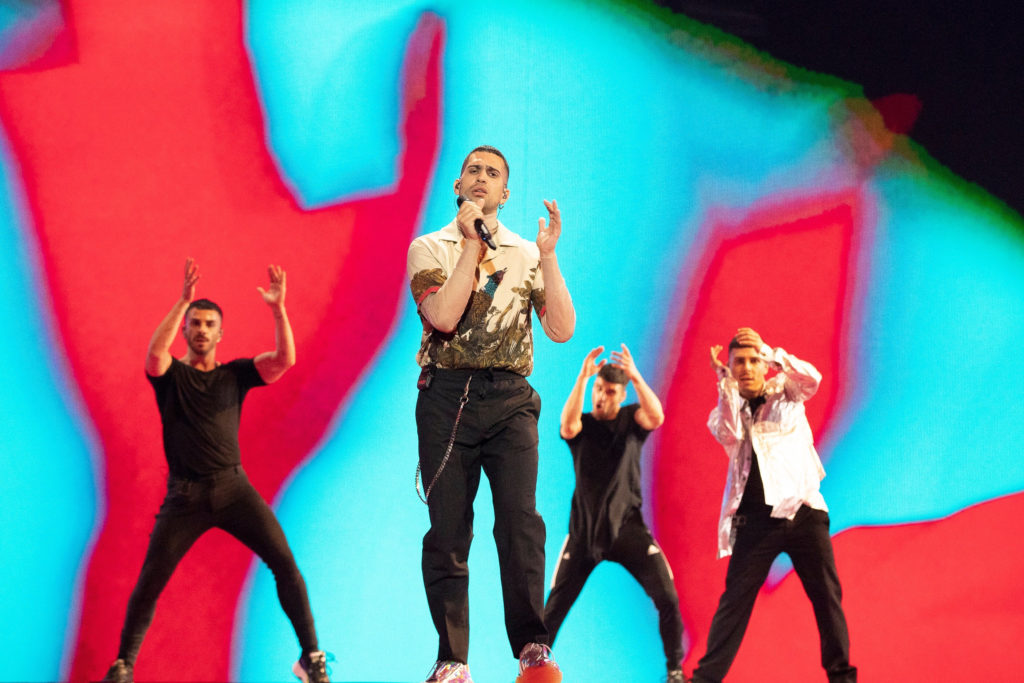
In the ‘mood to win?
The History Book on the Shelf
When I was growing up in Israel, it wasn’t cool to be a Eurovision fan. There was this lull between the 1979 competition and the 2019 one – both taking place in times where liking the contest was perfectly acceptable, and even to be expected – where people preferred to pretend they really couldn’t care less.
Even then, there was that one Sunday every year where kids would discuss Eurovision performances during the morning’s gym class, and the same people in my military base who made fun of me when they found out I like Eurovision somehow managed a very informed discussion about the performances and results of the 2000 final.
Things were different this year. I’m not just talking about being able to walk into pretty much any shop in Tel Aviv and not only have animated discussions about this year’s favorites, but also being regarded with respect and bombarded with questions by people keen to learn more. It wasn’t even the news coverage, because when Eurovision gets so many hours of that, you have to think out of the box for more ideas – but I enjoyed seeing the interviews with previous Israeli hosts, features about the orchestra and conductors, and especially a very cool story in which the directors and producers of the 1979 and 1999 shows came to visit the 2019 set.
But no, the real reflection of how much we truly do love Eurovision in Israel was generously sprinkled across all three live shows. The video montages in both semis, as well as the final promo montage which was aired in the second semi and the montage opening the final with explanations on how to follow the show and vote, were easily among my favorite segments in any Eurovision ever. Sure, they featured a lot of familiar favorites, but they also included a wonderful selection of choices that I suspect the majority of non-fan viewers had no memory of, yet it worked wonderfully in context – because even if you didn’t recognize the specific clips, the whole thing was so undeniably Eurovision.
I loved all the touches and nods to Eurovision history during the final – local and international, recent and not so recent. Having Netta, last year’s winner, in the opening video, together with Jon Ola and a little touch of the 1979 winner, set the tone for the night. The late Ofra Haza got her moment of recognition when her iconic “Im Nin’Alu” was played during the flag ceremony, and it was wonderful seeing our first entrant – a household name to this day – getting the respect she deserves on center stage. There was a nod and a wink to a recent success, too: Nadav Guedj was the first entrant we sent when our selection system was changed to the cooperation between the national broadcaster and the commercial channel, a system that brought us a win four participations later, and while nothing could be more obvious than bringing him to sing (or, well, mime) the words “let me show you Tel Aviv”, it was also entirely appropriate.
All four winners were involved in one way or another. Netta obviously opened both the first semi and the final, “A-Ba-Ni-Bi” got a brilliant video montage of highlights from this year’s postcards during the first semi and Izhar Cohen presented the Israeli points during the voting, although rumor is he was a bit upset about being the only winner not invited to sing anything. Don’t worry, Izhar, I’m pretty sure Dana didn’t really sing anything either. Speaking of the diva, I didn’t care much for her semi interval – because, ugh, that song – but her final appearance offered a clever transition from “Tel Aviv”, one of the biggest hits penned by Doron Medalie (the co-composer of last year’s winning entry), into her own Eurovision winner, “Diva”.
I personally also really enjoyed everything about seeing recent participants singing each other’s songs. Not just the different takes, but mostly the idea of involving Eurovision artists from other countries – we’re all in this together, after all – and even more so, including notable runners-up and not just winners, because there’s more to this than just winning. For me, it was particularly sportsmanlike to invite last year’s runner-up to take part and share some of the spotlight.
There was never a way in which our Eurovision hosting trademark, a group singing of “Hallelujah”, wasn’t going to happen. And for all I roll my eyes at that kind of sappiness most of the time, insert a joint performance of that song into the right context – namely Eurovisions hosted in Israel – and you might as well just hand me that entire damn tissue box.
That was also accompanied by one of the most genius visual moments of all-time at Eurovision – the reincarnation of the 1979 stage. So simple, so brilliant.
Either way, don’t let anyone fool you. The Irish can show off their seven titles until Sweden overtakes them, and Sweden can show off how they are about to overtake the Irish, but mirror mirror on the wall, who loves Eurovision more than all?
Yes, that would be us. We love Eurovision. We really do.
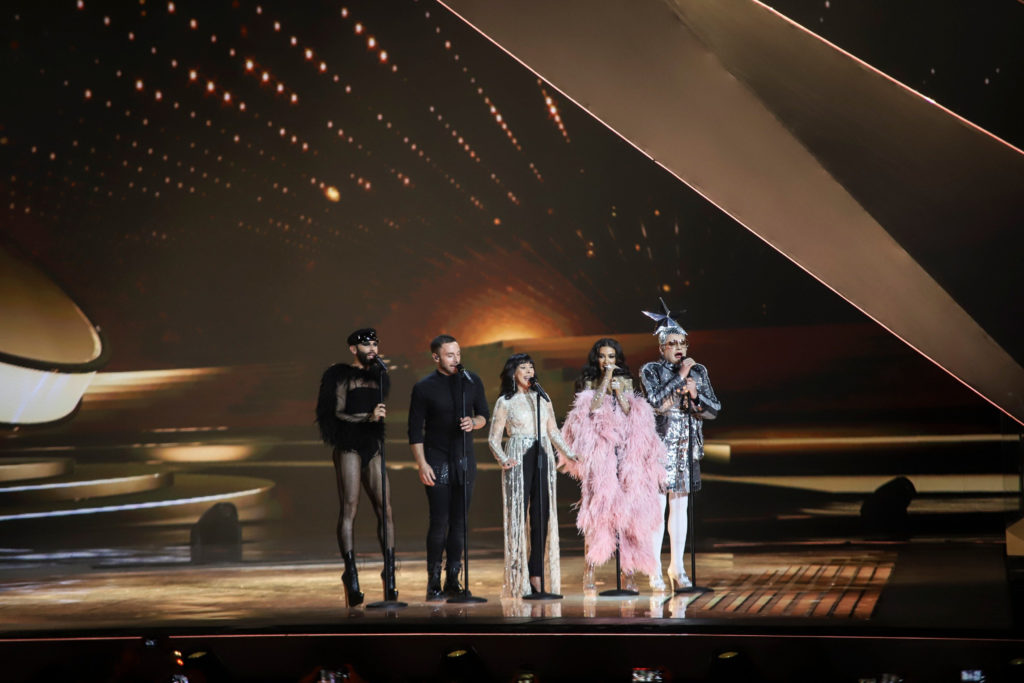
We’ll follow along
On a Sunday
I said goodbye to Eurovision 2019 on a Sunday. Literally, and not because Sunday clearly comes after Saturday and Eurovision clearly happens on a Saturday night.
Having Eurovision in Israel means my Saturday night schedule was pretty much this: The final started at 22:00, finished at some point after two in the morning, and that was followed by some press center commotion, hugging emotional Dutch fans and running to catch the bus to Euroclub. So when the afterparty only starts at 3am and the weather is so warm and nice it allows you to spend most of the night in the outdoor patio area, so you can have conversations with people where you can actually hear one another and say proper goodbyes, it’s easy to stick around and forget it’s been a while since the last time you left a party once the sun had already come up.
But that was how I found myself standing by the outdoor bar, at 7am, in broad daylight, having an animated conversation with Fred from KEiiNO. We covered a variety of topics, starting with his admiration of Mahmood’s voice and “Soldi” (can’t argue there) and how he thinks Mahmood will make an excellent joiker (I probably could argue there), through him making fun of my very old smartphone (but then expressing an admirable amount of both respect and self-restraint when I explained my life choice of not actually using anything that requires internet on a phone, which apparently was an acceptable explanation as to why I wouldn’t need anything particularly sophisticated in my hand), to then realizing that Tom and Alexandra had ditched him at some point and having no clue how to get back to his hotel (I pointed him to the direction of the taxis, because I’m nice like that). We both tried – and failed – to understand what the two drunk women who joined our conversation were saying, and when the security people came to shoo us out, it turned out I had a lot less interest in being yelled at by Israeli security guards than the rest of them, so I left them to it and made my exit.
As I was walking towards the main road, I passed by a gathering of deliriously happy and unsurprisingly drunk Dutch fans belting “Arcade” (it’s really not the best party song, is it?), then momentarily joined a trio of girls sitting outside a small café who were shouting “Goodbye, Estonia!” at Victor’s back as he disappeared into a cab – before I reached the bus stop, entirely on my own and accompanied by the usual busy sounds of the first morning of the new week, because yes, in Israel our week actually starts on a Sunday. And just like that, the journey that was Eurovision 2019 was over.
Until next year, Eurovision.
See you in Rotterdam. Or anywhere.
All images from eurovision.tv
Visit our Eurovision Chat!
1 Comment
1 Comment
-
Shai on July 11, 2019 at 10:29 pm
I would like to compliment you for your coverage of the 2019 contest.
You have a way of writing that bring things to live and it make me fill I was there.I think KAN treated the contest with a lot of respect. There was no making fun or ridiculing the contest. This was reflected in various segments of the show. The EBU should be very happy with such a treatment.
A nice touch was Portugal starting the juries vote and Israel as the last country giving it points. If I am not mistaken, this was the first time it was like this and if t was for the first time, they should make it a tradition.
Thank you for your coverage- looking already forward for next year
Visit our Eurovision Chat!
Follow us:
ESC 2025: Semi-final running orders revealed!
Who’ll be singing where in which semi-final? It’s the big question – and the official Eurovision YouTube account revealed all this evening!
SongHunt 2025 – Semi-final 3
The SongHunt continues! Semi-final 3 is open and YOUR votes will help to decide who qualifies, so get involved!
SongHunt 2025 – Semi-final 2
The SongHunt continues! Semi-final 2 is open and YOUR votes will help to decide who qualifies, so get involved!
SongHunt 2025 – Semi-final 1
Let the SongHunt begin! Semi-final 1 is open and YOUR votes will help to decide who qualifies, so get involved!
SongHunt 2025 is launched!
It’s time for SongHunt 2025! The public polls and chat events are nearly upon us, and there are some changes you’ll want to know about – so read all about it here and save the dates in your calendars!
Potted Basel: Allocation draw for 2025 takes place
Today saw the allocation draw for the 2025 Eurovision Song Contest to be held in Basel, Switzerland. Here’s how the countries will line up in the two semi-finals!
RetroSongHunt 2004: Join us as we celebrate 20 years of #esc!
Our chat community celebrates its 20th anniversary on the first weekend of June – so what better way to celebrate than with a special chat event dedicated to national final songs from back when we began? Read all about it here!
Who will win the Eurovision Song Contest 2024? Our prediction for the final
Happy Eurovision – the big day has arrived! Tonight the grand final of ESC 2024 will be held in Malmö, Sweden. But who will hold the trophy at the end of the show? It’s time for our team’s predictions!
The View from Israel: Unforgettable
There’s one more night left for Eurovision 2024, and Shi is hoping we can all enjoy it a little.
Overthinking the 2024 grand final running order
As the dust settles on the second semi-final, Martin takes a look at what the producers have come up with for the ESC 2024 grand final running order and what – if anything – it might mean…
ESC 2025: Semi-final running orders revealed!
Who’ll be singing where in which semi-final? It’s the big question – and the official Eurovision YouTube account revealed all this evening!
SongHunt 2025 – Semi-final 3
The SongHunt continues! Semi-final 3 is open and YOUR votes will help to decide who qualifies, so get involved!
SongHunt 2025 – Semi-final 2
The SongHunt continues! Semi-final 2 is open and YOUR votes will help to decide who qualifies, so get involved!
SongHunt 2025 – Semi-final 1
Let the SongHunt begin! Semi-final 1 is open and YOUR votes will help to decide who qualifies, so get involved!
escgo! on Twitter

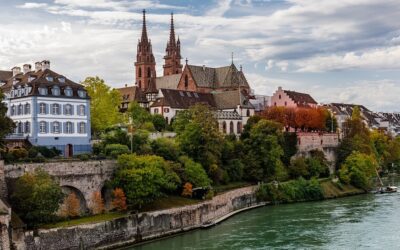

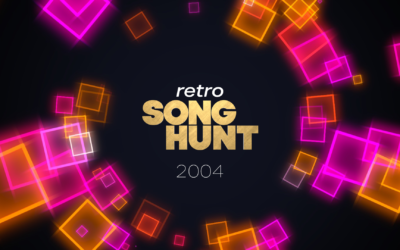

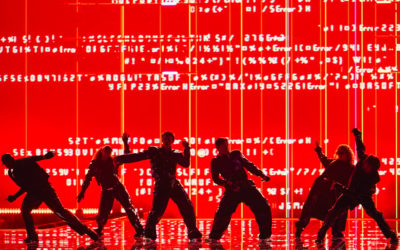
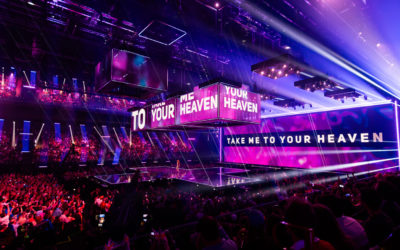
I would like to compliment you for your coverage of the 2019 contest.
You have a way of writing that bring things to live and it make me fill I was there.
I think KAN treated the contest with a lot of respect. There was no making fun or ridiculing the contest. This was reflected in various segments of the show. The EBU should be very happy with such a treatment.
A nice touch was Portugal starting the juries vote and Israel as the last country giving it points. If I am not mistaken, this was the first time it was like this and if t was for the first time, they should make it a tradition.
Thank you for your coverage- looking already forward for next year